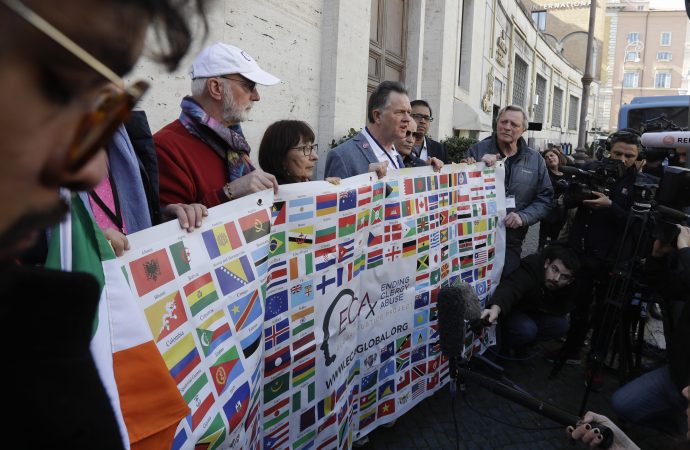So Far at Pope’s Anti-abuse Summit, Survivors Are Stealing the Show
By John L. Allen Jr.
As Pope Francis’s high-stakes summit on clerical sexual abuse opens today, perhaps the biggest question pundits and handicappers will be asking is how well the agenda of victims and survivors will fare in the bishops’ deliberations. The day prior to the opening of the summit, a group of survivors stole the show before the curtain even went up. Since the beginning of the abuse crisis, bishops and other Church officials seeking to turn things around have often touted their listening sessions with victims, and even popes, beginning with Benedict XVI during his 2008 trip to the United States, have gotten into the act. Critics have charged that those victims were often selected precisely because they were tame, unlikely to push back or do much publicly other than expressing gratitude. On Wednesday, however, a dozen of the world’s most outspoken survivors of clerical abuse and advocates sat down with the summit organizers. Typically, they didn’t all come out saying the same thing … which, in a way, was probably the point. Some of those survivors came away ticked off that Francis himself didn’t show up, even though his presence was never part of the plan. Their irritation boiled over when Archbishop Charles Scicluna of Malta - the “Eliot Ness” of the Catholic Church, who, as a Vatican prosecutor brought down Father Marcial Maciel Degollado, founder of the Legion of Christ - said in response to various suggestions made by the survivors, “Remember, I’m not the pope.” The attitude of some survivors about that line boiled down to, “Then why the hell isn’t the pope here?” Others, however, were more inclined to give Francis a break, saying he’s doing what he can and challenging bishops to follow his lead. On other points too, there were clear differences among participants in the meeting. One victim wanted the Vatican to release information on all priests who’ve been defrocked since the beginning of the abuse crisis, another wanted the creation of a global truth commission, and yet another had a more local focus - wanting action taken against the current Archbishop of Milan, who’s been accused of covering up an abuse case when he was the vicar general of the archdiocese. Perhaps one take-away is that there is no cookie-cutter, one-size-fits-all model for what an abuse survivor thinks, feels or wants, and taking their voice seriously means in the first place recognizing that it only comes in the plural, “voices.” Speaking of those voices, for anyone who’s been following the arc of the clerical abuse crisis for a while, one striking thing about this summit is the extent to which survivors and their advocates are actually setting the tone and shaping the narrative. A Tuesday news conference staged by Voices of Faith, an advocacy group promoting greater inclusion of women in Catholic affairs, featured Barbara Dorris, an abuse survivor herself who for almost two decades has worked for the Survivors Network of those Abused by Priests (SNAP). Dorris was asked about the difference between this moment in the abuse crisis versus previous stages, and talked about her experience of coming over for the papal conclave in 2005 that elected Cardinal Joseph Ratzinger as Pope Benedict XVI. “We had to beg for interviews,” she said, describing a climate of near-total media indifference. She contrasted that with Tuesday’s turnout at the Foreign Press Club in Rome, which was basically standing room only, suggesting that there’s far greater receptiveness to their message now. That scene is being played out time and again these days, as survivors so far have been the stars of the show in Rome. And, once again, it’s not just any victims setting the tone, but those most likely to voice skepticism of official party lines. To be sure, that’s hardly an unmixed blessing as far as the Vatican is concerned. For instance, at Tuesday’s presser a journalist asked the six women speaking at the Voices of Faith event what they make of the pope’s summit. Dorris opined that in her view “it’s all for show,” and when asked if they shared that view, all the other women expressed agreement. Obviously, the pope’s spin doctors probably wouldn’t be thrilled hearing their big event styled as little more than an expensive photo op, and of course before it happens it’s impossible to assess how fair such a perception really is. Yet here’s a point that’s worth making: So far, survivors have had more or less free rein to say whatever they want, in official venues and outside them, without anyone in officialdom firing back or getting defensive about their declarations. “We didn’t bite our tongues,” said Spanish survivor Miguel Angel Hurtado about the meeting Wednesday with summit organizers. “We said things as they are.” Saying things as someone perceives them to be, in itself, is hardly new. Church officials allowing them to do that within earshot of the precincts of power within the Vatican, however, without any recrimination or umbrage, actually is - and that alone, perhaps, may count as a sort of progress.
|
.
Any original material on these pages is copyright © BishopAccountability.org 2004. Reproduce freely with attribution.
